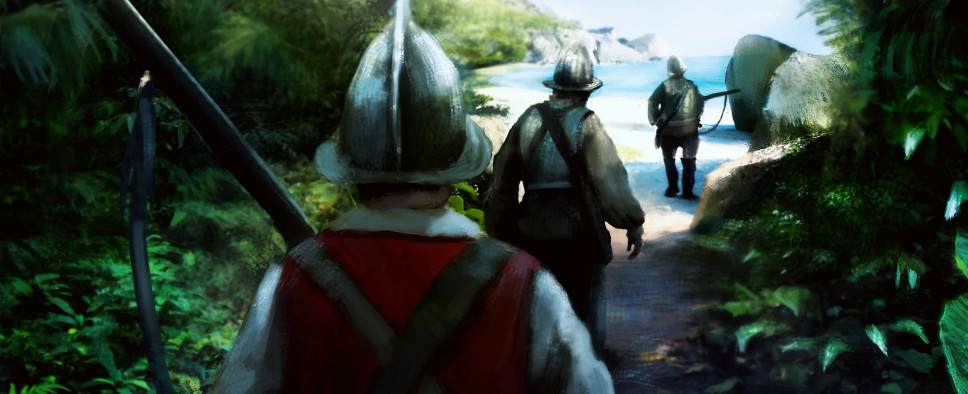Expeditions: Conquistador Review - Page 2
-
Category: ReviewsHits: 11264

Article Index
And the game is very much eager to provide you with plentiful opportunities for that in its two campaigns. The first one is smaller and doubles as the tutorial. There, you'll be dealing with some rebels trying to overthrow Hispaniola's legitimate governor, and in the process learning the ropes, interacting with the natives, and immersing yourself in the game's setting.
The second campaign is the main dish, then. The map is larger, the stakes are higher, and you get to explore all the story threads introduced in the first one. The big thing there is a civil war within the Aztec empire, where you can support one of two warring factions, or alternatively use this chaos to your advantage and pillage a bunch of valuables, since the game's ending depends among other things on how rich you are by the time you're done with your campaign.
The game's world is populated with major and minor settlements where you can trade, interact with the locals and take up quests in a very much RPG fashion. Outside of those, you'll be traversing a wild and untamed land packed with events, points of interest, and treacherous terrain. The curious thing here is that you can pan the camera, but only a little, so you never know what you'll discover next.
All of this is presented to you through a bird's eye view reminiscent of King's Bounty or Heroes of Might and Magic, where your party is represented by a lone horseman and all the points of interest are usually just one or two buildings you have to click on to start an event.
Your party has a limited number of movement points that last you longer on roads than they do in some Aztec swamp. Once you're out, you need to make camp and feed your troops. Making sure you have sufficient supplies is crucial, as food in Conquistador has the annoying tendency to run out.
Camping also leads to various events where your followers get to argue or fall in love, slaves become especially rebellious, and thieves will do their best to steal everything not bolted down.
To make things at least somewhat manageable, you'll be able to task your followers with guarding your camp, scouting the surrounding areas, and hunting for extra supplies. While camping, you'll also be able to tinker with your equipment, improving your party's long-term performance. Tinkering also allows you to create consumables like net traps and caltrops you'll then use during battles. And on occasion, contextual events will allow you to go fishing or raid burial grounds.
Still, it's pretty much impossible to perfectly cover all your bases while camping. Things will go wrong. The important thing then is how you deal with those setbacks.
With the game being out for quite a while at this point, you can't help but hear things. And one of the more common complaints about Conquistador is that managing your camp is too annoying. And because of that, Viking already simplified camping, and now Rome is looking like it's going to move even further away from Conquistador in that regard.
And that's really a shame. First of all, there really isn't anything too daunting about camping. When starting your campaign, you need to make sure to use perishable meat before your usual rations, task your soldiers with guarding the camp, hunters with hunting, etc. And that's pretty much that. You have the basic setup that will carry you through the game. You will only have to alter it when a contextual event pops up, you get a surplus of meat, or some of your soldiers get injured during a battle.
But in return for this slightest bit of hassle, you get rewarded with a feeling of managing a party in an untamed land, watching supplies dwindle, and not knowing if you'll be able to find some rations for your troops.


